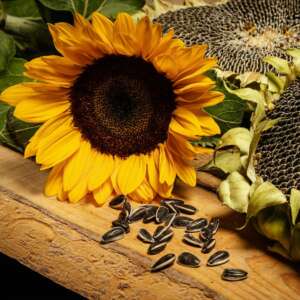
Sunflowers are one of the most recognizable flowers on Earth. They are native to North America and have been cultivated for thousands of years as a source of food and decoration. Sunflowers are usually thought of as being yellow, but they also come in shades of red, orange and bronze. They can reach impressive heights of 30 feet or more and they are also good in helping clean up polluted soil, as they absorb toxins and heavy metals. But it’s the seeds that are the true superheroes.
The seeds of the sunflower reside in the large, dark, center blossom of the sunflower, which is simply called the head. These seeds appear in a distinctive, repeating geometric pattern called the Fibonacci Sequence. This pattern is surprisingly common throughout nature. And these seeds are more than just snacks for baseball players. Sunflower seeds offer a lot of health benefits.
1. Nutrient Rich – Sunflower seeds are dense enough in nutrients that you only need 1 – 2 tablespoons each day. They are great source of magnesium, B vitamins, calcium, phosphorus, copper, iron, manganese, carotene, protein, vitamin E, zinc, mono / polyunsaturated fats, potassium, sodium and selenium. Eat a few of these and skip all the supplements.
2. Cardiovascular Disease Fighter – The healthy fats, monounsaturated and polyunsaturated, found in sunflower seeds keep blood cholesterol levels under control in the human body. Excessively high cholesterol can narrow or clog the blood vessels, which can increase one’s risk of stroke and heart disease. Many published scientific papers demonstrate that there is substantial evidence that increased consumption of seeds is associated with lower risk of cardiovascular disease.
3. Helps Prevent Diabetes – Sunflower seeds are a high fiber food and high fiber foods are known to slow the rate at which sugar is absorbed into the bloodstream. Due to the reduction in blood sugar crashes and spikes, eating sunflower seeds may lower one’s chances of developing insulin resistance and diabetes. And for those already suffering with diabetes, sunflower seeds can help regulate blood glucose levels between meals.
4. Inflammation Reducer – Sunflowers are an excellent source of vitamin E. This vitamin helps the human body reduce chronic inflammation, which scientists believe plays a role in the development of a variety of severe conditions, including heart disease, diabetes, cancer, autoimmune diseases and clinical depression.
5. Improves Immunity – Insulin resistance and consistently high blood sugar can cause problems with the body’s immune response and lead to inflammation, unnecessary weight gain and even various cancers. The effects of sunflower seeds on the immune response may be of special interest to many individuals who struggle to maintain their health.
6. Antioxidant Powerhouse – Sunflower seeds are also known for their antioxidant content. Antioxidants are essential for helping the body mitigate the damage caused by free radicals. A high level of free radicals in the body causes a condition known as oxidative stress. This condition makes the body susceptible to disease and can bring direct damage to the body’s cells and DNA. Free radicals and oxidative stress are both linked to emphysema, macular degeneration, inflammatory diseases, ulcers, Parkinson’s, Alzheimer’s and cancer.
7. Helps Skin, Muscles, Brain and Metabolism – A diet full of seeds includes better skin health, fewer instances of muscle cramps due to the presence of pantothenic acid and improved thyroid function. The thyroid, for example, regulates your metabolism. It’s also instrumental in brain development, mood regulation, memory, weight management and muscle control. When not working correctly, you can experience symptoms like nervousness, rapid heartbeat, fatigue and forgetfulness.
Will sunflower seeds revolutionize your health? Probably not. But when you incorporate healthier options into your daily diet, it can add up over time. And there are plenty of ways to add sunflower seeds into the mix. You can use them as a salad or cereal topper, roast them and keep them for an on-the-go snack, blend them into a nut butter, add them into a stir fry, blend them into a smoothie for an added protein boost or add them to homemade breads and muffins.
No matter how you incorporate them, these little gems should be on your shopping list, if for no other reason than the nutritional value they offer. And now is the perfect time of year to swing by the local farmers market or flower farm and pick up a bunch. Go ahead and give em a try.

